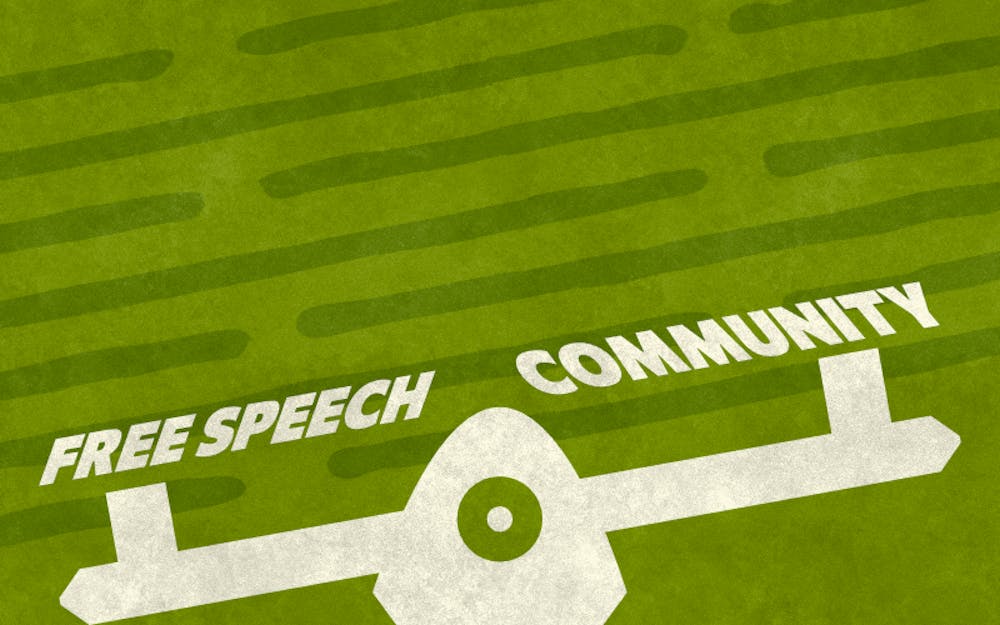
Last Wednesday, Anthropology professor Robert Schuyler participated in a Society for Historical Archaeology (SHA) annual conference, where he used a Nazi gesture and phrase directed at another panelist. When University of York Ph.D. candidate Liz Quinlan, who was speaking about increasing the accessibility of the SHA, deemed Schuyler’s question not relevant to her presentation, he replied, “I’m sorry, but I have freedom of speech, and you’re not going to tell me it’s not the place to bring this up.” He then held his arm up in a Nazi salute and stated, “Sieg heil to you,” a victory slogan originally used by the Nazi Party and later adopted by white supremacists in the United States.
From his retort during the conference to his statements after the incident, Schuyler has continued to cite “freedom of speech” as the reason and justification for his behavior. In order to demand an answer to his question about membership renewals, he reminded Quinlan of this fundamental right. When asked about potential repercussions for his Nazi gesture and phrase, he also told The Daily Pennsylvanian that “there is a fine line between [being told off for one's actions], and suddenly we’ve all lost our freedom of speech.” However, this interpretation of free speech, which skirts culpability through an allegiance to the Constitution, is in fact representative of a broad issue that we currently face within political dialogues: a distorted view of free speech.
Our reckoning on matters of racial and gender equality in recent years have given rise to a heated debate on what is acceptable speech, especially in light of “cancel culture.” Nowadays, such a culture manifests itself in all aspects of the public discourse, from the use of discriminatory language on social media to seemingly intolerant studies in academia, and is sometimes characterized by the unpleasant feeling that even minor ideological transgressions could lead to a slew of heretic hunts. In an email later uploaded to Twitter, Schuyler made an explicit reference to this phenomenon in an attempt to clarify his intentions of his Nazi salute. He wrote that “too many people are acting like [Nazis] in trying to silence people and ‘cancel’ them out of existence,” which hints at perceived parallels between Quinlan’s refusal to answer his question, cancel culture, and Nazi Germany’s free speech restrictions.
However, his statement completely fails to distinguish between a violation of free speech and an expectation of common courtesy from his colleagues. Any conference operates with not only time constraints but also the need to remain on-topic so as to help speakers deliver their points. Allowing Quinlan to continue addressing questions about accessibility issues was simply a matter of respect for the meeting and her speech in particular. In their brief exchange, there was no need to invoke his right to free speech because no one was trying to strip it from him, let alone “cancel” him. Schuyler’s inclination to associate the panelist with cancel culture — not to mention Nazi Germany — is thus nonsensical. It goes without saying that simply being asked to table a discussion on membership renewals is not at all comparable to the atrocities committed by such an oppressive regime.
His presumption that freedom of speech also protects him from any punishment more severe than “getting yelled at” also suggests a warped view of what this right ought to defend at its core. Free speech, which has traditionally been a tool for the political left to sow seeds of social change, is now commonly cited by those on the opposite side of the political spectrum to fend themselves from cancel culture and the like. The rationale behind their claims is that, in the name of pursuing truth, some people will inevitably be offended. In fact, the United States, in contrast to most other liberal democracies, embraces a history of defending even hate speech in landmark Supreme Court cases for this very reason: seeking truth. In Snyder v. Phelps (2011), which involved protestors at a funeral using homophobic slurs, Chief Justice John Roberts wrote that “[a]s a Nation we have chosen … to protect even hurtful speech on public issues to ensure that we do not stifle public debate.”
Schuyler’s Nazi references during the conference, however, by no means constituted a pursuit of truth through a free market of ideas. Myriad alternatives were available at his disposal to seek recourse if he felt he had been inappropriately prevented from asking his question. Schuyler’s decision to make a Nazi salute and utter one of the party’s victory slogans was a conscious decision that cannot be viewed as anything but a means to provoke and intimidate Quinlan. And although he retrospectively explained that he was simply alluding to free speech in Nazi Germany, the average participant or viewer of the call is not able to glean that message from his actions.
In the aftermath of the conference, Quinlan, Penn Anthropology Department Chair Kathleen Morrison, and a number of affiliate organizations like the Penn Museum released statements condemning the professor and guaranteeing that this incident will be properly addressed. It is unclear what the consequences of Schuyler’s behavior will be or what he deserves. However, the University and other organizations should take into account his responsibilities as a faculty member, which at the very least should involve guaranteeing that his students feel safe and respected in an educational environment.
ANDY YOON is a first-year student in the College and Wharton from Seoul, South Korea. His email address is andyy327@wharton.upenn.edu.
The Daily Pennsylvanian is an independent, student-run newspaper. Please consider making a donation to support the coverage that shapes the University. Your generosity ensures a future of strong journalism at Penn.
Donate







